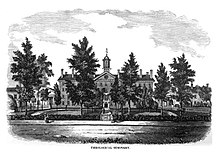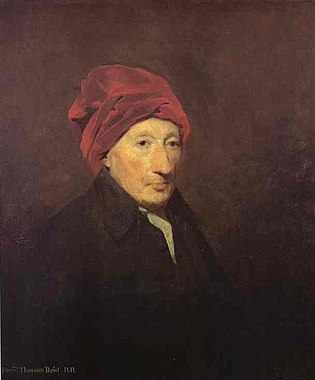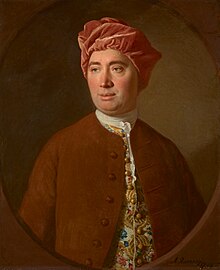Scottish common sense realism
[8] Reid painstakingly developed his treatise An Inquiry into the Human Mind on the Principles of Common Sense over the course of 40 years, often seeking the input of his contemporary philosophers within the Scottish Enlightenment including Hume.Senses are an extension of the faculties; they produce conceptions qualities (like how a smell suggests the existence of an object) and ground our beliefs (Nichols and Yaffe 45).In practice, philosophers of the Scottish school offered scientific explanations to historical events and advocated an unprejudiced and inter-disciplinary approach to education, free from religious and patriotic biases.[12][13] Thomas Reid and Dugald Stewart offered related theories of perception rooted in Scottish Common Sense Realism.Reidian thought was the "orthodox philosophy of colleges and universities"[4] in the early 18th century and provided an intellectual bedrock for the Age of Enlightenment.[17]: 180 Hailed by some as the "father of modern psychiatry",[17]: 173 Benjamin Rush's tutelage at the University of Edinburgh imbued him with strong realist tendencies which influenced much of his scientific and political work including his moral opposition to slavery.[17]: 174 Evidence of the influence of Scottish Common Sense realism can readily be found in the philosophy of both Thomas Jefferson and John Adams.[19] New Testament scholar Grant R. Osborne concludes that Scottish Common Sense Realism influenced biblical hermeneutics, that the surface level understanding of Scripture became popular, and individualistic interpretations abounded.

Scottish artThomas ReidrealistphilosophyAdam FergusonJames BeattieDugald StewartScottish EnlightenmentDavid HumeThomas JeffersonepistemologicalJohn LockeGeorge BerkeleyWilliam HamiltonThomas CarlyleIsaac NewtonFrancis BaconparadoxscepticismEdward S. ReedDescartesTheory of Ideassense experienceGeorge TurnbullmetaphysicalSt. Paul's ChurchNicholas WolterstorffYale UniversityVictor CousinAge of EnlightenmentDeclaration of IndependenceJohn TrumbullCommittee of FiveUnited States two-dollar billAmerican RevolutionBenjamin RushUniversity of EdinburghJohn AdamsAristotleRené DescartesJohn WitherspoonPrinceton UniversityConstitutional ConventionJames MadisonJames McCoshNoah PorterPrinceton SeminaryPrinceton TheologiansGrant R. OsbornehermeneuticsAdam SmithDirect realismFrancis Hutcheson (philosopher)James Frederick FerrierNaive realismScottish philosophyThomas Brown (philosopher)Paul Edwards

